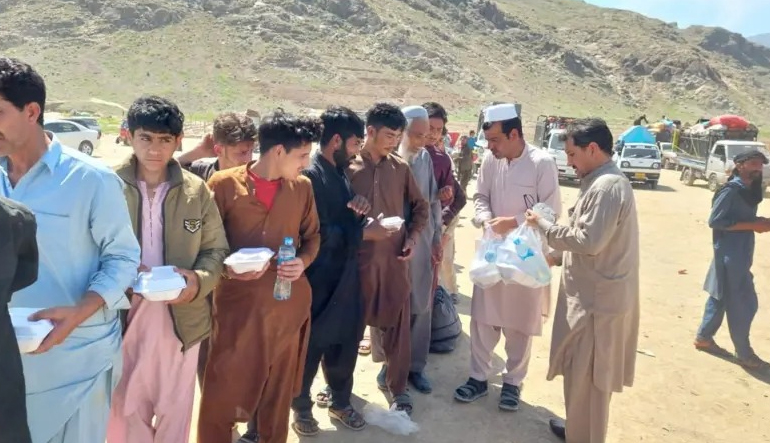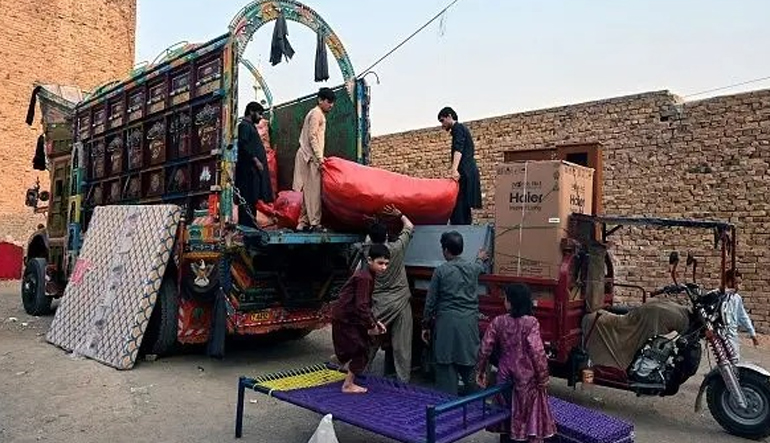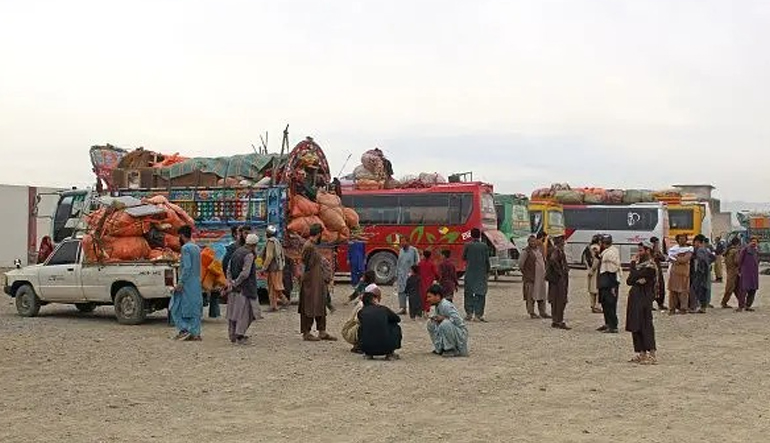The process of Afghan refugee deportation from Pakistan has resumed once again, accompanied by a series of arrests and raids as part of a wider Pakistan refugee crackdown. This phase of the forced repatriation of Afghan nationals is seeing intensified focus in Punjab and Islamabad, where authorities are deporting illegal Afghan immigrants in Pakistan. Some stateless Afghan refugees expressed their distress, saying, “We live under a constant shadow of fear — we no longer have a homeland… In Pakistan, we are seen as Afghans, and in Afghanistan, we are considered Pakistanis.” This reflects the deep identity crisis of Afghan refugees, many of whom feel displaced on both sides of the Afghan-Pakistani border. Let’s first take a look at how the repatriation of Afghan refugees is currently taking place and how the Afghan refugees' fear of deportation continues to grow.
Raids and Arrests
A large-scale operation by the federal government of Pakistan is underway against undocumented individuals and holders of Afghan Citizen Cards. Since April 1, around 8,115 Afghan refugees have been arrested and deported back to Afghanistan via the Torkham border deportation, with more arrests continuing as part of the Pakistan refugee crackdown. However, this may be the first time that, unlike Islamabad and the other three provinces, no action has yet been initiated in Khyber Pakhtunkhwa Afghan refugees. According to local police sources, mapping efforts are underway in the province, including Peshawar, to identify illegal Afghan immigrants in Pakistan. An Afghan national shared that officials in Peshawar’s Board area, Tajabad, and Tehkal have contacted Afghan families and asked them to return to their homeland as part of the Afghan refugee repatriation process. Currently, the most active operations are taking place in the Punjab Afghan refugee crackdown, where hundreds of Afghan refugees are being arrested daily and taken to various holding centers. After proper verification, they are deported via the Pak-Afghan border at Torkham.

Fear among Afghan Refugees
"If I have to go back to Afghanistan, I will fall into depression." An Afghan woman teacher shared this with Dr. Noor, who is associated with an educational institution in Peshawar. According to Dr. Noor, the woman is a teacher and is suffering from severe anxiety, a common issue among Afghan refugees in Pakistan. She said that since the crackdown began, this woman has visited a doctor and is taking medication for mental peace, reflecting the fear of deportation felt by many Afghan refugees. Dr. Noor mentioned that female teachers and students have expressed that "If the government before the Taliban, where women were allowed to work, were still in place, it would have been fine, but now returning to Afghanistan feels like being locked up at home, even though they work here in Pakistan." This is an example of the uncertainty and anxiety that many Afghan refugees feel as they are caught between two countries. Similarly, an Afghan citizen from Rawalpindi claimed, "At the bus stations here, the police have instructed that no Afghan should be given a ticket to go anywhere." One Afghan, who wished to remain anonymous, said that they barely managed to reach Peshawar, even though they have a residency card, underlining the fear of arrest among Afghan refugees. After the Soviet invasion of Afghanistan, Afghan citizens sought refuge in various countries, with a significant number migrating to Pakistan. The third generation of Afghan refugees is now growing up in Pakistan, but they constantly live under the fear of deportation and the anxiety that any time action could be taken against them. Although no arrests have been made in Khyber Pakhtunkhwa during the recent operation, Afghan refugees in Khyber Pakhtunkhwa still live in fear. Since the Pakistani government's policy of Afghan refugee repatriation has been implemented, every Afghan household is filled with uncertainty. The same question haunts every Afghan: "We don’t know what will happen to us." The Torkham border has also seen controversy over the infiltration of dozens of Afghan children who risk their lives for "a few hundred rupees," a troubling development in the ongoing Afghan refugee repatriation process. Mohammad Nabi (a pseudonym) holds an Afghan Citizen Card and explains that his relatives are afraid that if arrests begin in Khyber Pakhtunkhwa, they won’t know where to go, adding to the identity crisis of Afghan refugees. He shared that they left all their belongings in Afghanistan when his parents first migrated. When conditions improved there, they returned, but after the Taliban took over, they once again came back to Pakistan and left everything behind, highlighting the uncertainty that plagues many Afghan refugees. In 2023, an operation was carried out against illegally residing Afghan refugees, and they were sent back to their homeland, continuing the Pakistani government crackdown on Afghan refugees.

More arrests in Punjab
A crackdown on illegal Afghan refugees and Afghan Citizen Card holders is ongoing in Pakistan, with the highest number of arrests of Afghan refugees in Punjab. Raids on Afghan refugees are being conducted in areas where Afghan refugees reside within Punjab, particularly focusing on illegal Afghan immigrants in Punjab. In Punjab, like in other provinces, Afghan refugees either engage in labor or have their own small and large businesses. An official at the holding centers stated, "On the first day, the individuals brought from Punjab showed signs of fear, and their condition was not good." The official further explained, "Last night, the illegal Afghan immigrants in Punjab brought from Attock for detention were experiencing symptoms of abdominal pain and digestive issues due to psychological stress and trauma. Their distress was evident on their faces." The official also mentioned that "The psychological condition of the refugees arriving later was much better than the first group. These included those Afghan refugees who were willing to leave voluntarily or had made up their minds; their behavior was appropriate. However, those who were forcibly arrested and brought in were increasingly distressed." The Department of Interior in Khyber Pakhtunkhwa has stated that, as of April 1, 2025, a total of 5,568 illegal Afghan refugees and Afghan Citizen Card holders have been deported to Afghanistan via the Torkham border. Among those sent through Torkham, 2,355 were Afghan Citizen Card holders, and 3,042 were illegal immigrants. According to the Department of Interior, a total of 160 individuals have been deported from Islamabad, 4,227 from various cities in Punjab, and one Afghan Citizen Card holder from Gilgit-Baltistan to Afghanistan via Torkham.

Why are there no arrests in Khyber Pakhtunkhwa?
According to the Khyber Pakhtunkhwa Department of Interior, a total of 488,187 illegal immigrants, including Afghan refugees in Khyber Pakhtunkhwa, have been deported from the Torkham border to Afghanistan since September 2023. An Afghan citizen residing in Peshawar shared that they gather in the evening and discuss what they should do. Although no arrests have been made in Khyber Pakhtunkhwa yet, and no action has been taken to deport them, Afghan refugees are concerned, saying, "We never know when the government’s policy here will change." This uncertainty adds to the fear and anxiety of Afghan refugees in Khyber Pakhtunkhwa, who remain in a state of limbo regarding the government's stance on refugees and the potential for Khyber Pakhtunkhwa deportation delays. Currently, Afghan refugees are facing difficulties once again, with many having either packed their belongings or are anxious about what to do with them, as they remain uncertain about the Khyber Pakhtunkhwa arrest policy. Khyber Pakhtunkhwa Chief Minister Ali Amin Gandapur recently spoke to reporters, stating that the federal government's policy regarding Afghan refugees is flawed, and his government will not force any Afghan nationals to leave. He mentioned that the federal government's policy could lead to negative consequences, highlighting the challenges faced by Afghan refugees in Khyber Pakhtunkhwa. He stated that their government would not forcibly expel anyone, adding, "Camps will be set up in the province, and those who wish to leave voluntarily will be sent off with dignity." Regarding this matter, Ali Amin Gandapur's brother, Member of National Assembly Faisal Amin Gandapur, said that "The federal government should review its policy. When the United States and the UK grant nationality to a child born there, a similar policy can be formulated to grant nationality to Afghan refugees in Pakistan." This reflects the growing concern about the treatment of Afghan refugees and the need for a more comprehensive approach to Khyber Pakhtunkhwa immigration policies. "He stated that Afghan citizens have made investments in Pakistan, and in the past, the expulsion of Afghan nationals had negative impacts on Khyber Pakhtunkhwa’s economy." This further emphasizes the need for a careful response to Afghan refugee repatriation in Khyber Pakhtunkhwa. The Pakistan Tehreek-e-Insaf (PTI) government in Khyber Pakhtunkhwa has always held the stance that there should be a better policy regarding Afghan refugees in Pakistan. Moreover, the provincial government has been pushing for negotiations with the Afghan government. Chief Minister Ali Amin Gandapur also mentioned that negotiations with Afghanistan could help bring peace to Pakistan, and provincial authorities have been in contact with both federal and Afghan officials, showcasing Khyber Pakhtunkhwa’s proactive response to refugee issues.
Are Afghan refugees heading towards Pakhtunkhwa?
After actions against Afghan refugees in Khyber Pakhtunkhwa, reports are suggesting that Afghan refugees from Islamabad and Punjab may head towards Khyber Pakhtunkhwa, but so far, there is no concrete evidence to support this. Property dealers in Peshawar state that they have not encountered any Afghan nationals who have arrived from Islamabad or Punjab due to the fear of raids in those areas. Sajid Yousafzai, the president of the Peshawar Property Dealers Association, mentioned that, according to his information, "Property dealers have not received any such Afghan refugees. However, if someone has come to stay with their relatives or acquaintances, or if someone has independently secured a place, we do not have any information regarding that." This should help with both maintaining flow and ensuring relevant keywords are integrated!
Are women, students, and musicians more worried?
In the current situation, Afghan refugee women's concerns, Afghan refugee students' anxiety, and the fears of those involved in music, such as Afghan musicians in Pakistan, are particularly prominent, as opportunities for them are limited in Afghanistan. There are over 500 Afghan individuals in Pakistan, including in Peshawar and Quetta, whose livelihood is connected to music and the arts. Most of them migrated to Pakistan during the establishment of the Taliban regime in Afghanistan, seeking refuge from the oppressive environment. The Afghan refugee fear among women and the Afghan refugee students' uncertainty are felt strongly as many of them do not know what the future holds. Rashid Khan is one of these Afghan artists. He mentioned that, "Although in Peshawar and Khyber Pakhtunkhwa they are not facing much trouble, there is intense fear among those involved in the arts in other parts of Pakistan." He further stated, "For these individuals, being expelled from Pakistan would essentially mean death, as the Taliban do not permit music and the arts." This reflects the Afghan refugees' emotional distress and the severe Afghan refugee impact on women and Afghan refugee families' challenges, particularly for those whose survival depends on the freedom to express themselves through the arts. The growing Afghan refugees' mental health issues continue to rise due to the uncertainty and fear of being forced back into a country where their rights are severely restricted.
Powered by Froala Editor



